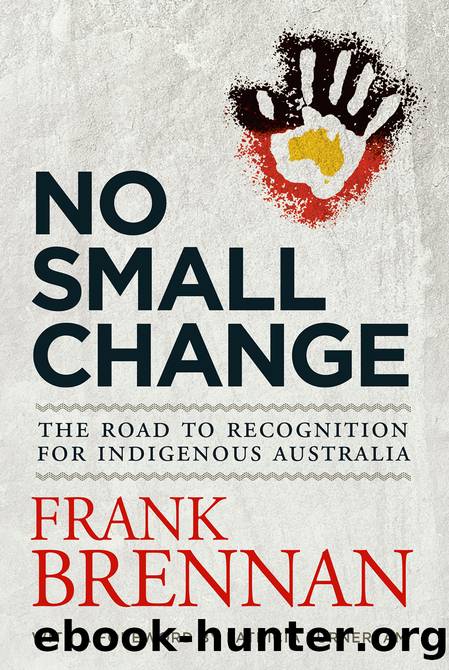No Small Change by Frank Brennan

Author:Frank Brennan
Language: eng
Format: epub
Publisher: University of Queensland Press
Published: 2015-03-30T00:00:00+00:00
For the LiberalâCountry Party Coalition Government, Prime Minister McMahon made almost no mention of Aboriginal issues in his campaign speech. He said:
We have announced programmes for urban and regional development, the protection of the environment, the promotion of the arts, and the welfare and advancement of our Aboriginal fellow citizens.
This has been done in the last 20 months â and it is only the beginning. We promise you that the return of this Government will guarantee further constructive and, above all, responsible changes â not for the few, but for the benefit of all.32
By the time Labor came to office, ânot a single âgeneral purposeâ lease had been approvedâ.33 The Coalition had failed to deliver any of their promised land reform. McMahonâs 1972 Australia Day address had effected no real change in land policy. But it had mobilised the Labor Party inside the parliament and the tent embassy protesters on the lawns outside. It had contributed to a change of government. During the brief two-week âWhitnard Governmentâ, when Whitlam and his deputy Lance Barnard held all portfolios, the CAA kick-started major reforms. Dexter had been living in the United States during JF Kennedyâs first 100 days as president and knew that resolute action was possible with a new government rightly focused. Dexter thought the ministry of two had turned policy around 180 degrees in just ten days. They recommended the appointment of Edward Woodward, who had been the barrister for the Aborigines in the Milirrpum case, to conduct the promised royal commission on Aboriginal land rights. They settled the commissionâs terms of reference, having to accommodate the ALPâs abandonment of an Aboriginal veto on mining activity on Aboriginal land.
The old Department of the Interior with its assimilationist culture was abolished. Dexter was appointed secretary of the new Department of Aboriginal Affairs (DAA), which had to absorb many of the old Interior personnel. He fostered good working relations with most Commonwealth and state departments. The old managers on remote Aboriginal communities in the Northern Territory were recast as community advisers. Universal alcohol restrictions were lifted. Aboriginal residents were told they were free to return to country; there was no need for them to remain within the town areas of communities. This was the beginning of the outstation movement. The CAA recommended the establishment of a Bureau of Advice and Aid for Aborigines.34 Cabinet was told that âthe local autonomy or self-determination of Aboriginal communities, as sought by the Government, cannot properly be fostered where all advice, community services, and development must be dependent on a department or departmentsâ.35
In his three years as prime minister, Whitlam had three ministers for Aboriginal affairs: Gordon Bryant, Jim Cavanagh and Les Johnson. Only Cavanagh had a good working relationship with his senior bureaucrats. The CAA had expected Manfred Cross to be the initial minister, but Bryant scored the position, in part because of his longstanding involvement with FCAATSI, which included many left-wing union members and politically active urban Aborigines. Bryant never saw a need to
Download
This site does not store any files on its server. We only index and link to content provided by other sites. Please contact the content providers to delete copyright contents if any and email us, we'll remove relevant links or contents immediately.
| Africa | Americas |
| Arctic & Antarctica | Asia |
| Australia & Oceania | Europe |
| Middle East | Russia |
| United States | World |
| Ancient Civilizations | Military |
| Historical Study & Educational Resources |
Machine Learning at Scale with H2O by Gregory Keys | David Whiting(4289)
Never by Ken Follett(3930)
Fairy Tale by Stephen King(3365)
Oathbringer (The Stormlight Archive, Book 3) by Brandon Sanderson(3123)
The Man Who Died Twice by Richard Osman(3062)
Will by Will Smith(2903)
Rationality by Steven Pinker(2348)
Can't Hurt Me: Master Your Mind and Defy the Odds - Clean Edition by David Goggins(2319)
The Dark Hours by Michael Connelly(2299)
Friends, Lovers, and the Big Terrible Thing by Matthew Perry(2211)
The Dawn of Everything: A New History of Humanity by David Graeber & David Wengrow(2186)
Principles for Dealing With the Changing World Order: Why Nations Succeed and Fail by Ray Dalio(2031)
A Short History of War by Jeremy Black(1833)
HBR's 10 Must Reads 2022 by Harvard Business Review(1832)
Go Tell the Bees That I Am Gone by Diana Gabaldon(1746)
A Game of Thrones (The Illustrated Edition) by George R. R. Martin(1707)
Kingdom of Ash by Maas Sarah J(1661)
515945210 by Unknown(1660)
443319537 by Unknown(1541)
